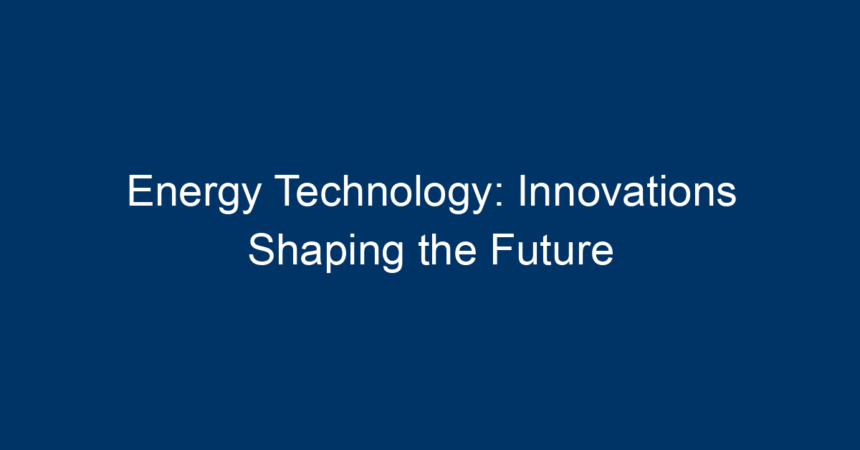In an era marked by rapid technological advancements and the pressing need for sustainable solutions, energy technology is at the forefront of innovation. As economies worldwide strive to reduce carbon footprints and embrace cleaner energy sources, groundbreaking technologies are emerging to transform how we generate, consume, and manage energy. This article will delve into the latest innovations in energy technology that are shaping our future, from renewable energy sources to smart grids and energy storage systems.
The Shift Towards Sustainable Energy Sources
Harnessing Renewable Energy
One of the most significant trends in energy technology is the shift towards renewable energy sources such as solar, wind, and hydropower. These technologies aim to reduce dependency on fossil fuels, which are major contributors to climate change.
-
Solar Energy: Solar panels have become increasingly efficient and cost-effective. Innovations like bifacial solar panels and solar skin technology are making solar energy more accessible. By maximizing sunlight absorption and blending with the home’s architecture, homeowners can benefit from clean energy without sacrificing aesthetics.
-
Wind Energy: Advancements in turbine design and materials are revolutionizing wind energy. Floating wind farms are now feasible, allowing energy generation in deeper waters where winds are stronger and more consistent.
- Hydropower: Modern designs, including micro-hydropower systems, allow for more localized energy generation, which is especially beneficial in remote areas. These systems take advantage of small rivers and streams, providing off-grid energy solutions.
Innovations in Biomass and Geothermal Energy
Biomass and geothermal energy are also gaining traction. Biomass technology converts organic materials into energy, reducing waste and providing a renewable energy source. Similarly, geothermal energy taps into the Earth’s heat, offering a stable energy source that can operate 24/7, unlike some renewable sources that depend on weather conditions.
Energy Storage Technologies: Powering the Future
One of the critical challenges of renewable energy is its intermittency. As we increasingly rely on these sources, efficient energy storage technologies become vital.
The Rise of Battery Technologies
-
Lithium-Ion Batteries: The backbone of energy storage currently, lithium-ion batteries have revolutionized energy technology. With increasing efficiency, decreased costs, and scalability, they are widely used in everything from electric vehicles to residential solar systems.
- Solid-State Batteries: A promising innovation on the horizon, solid-state batteries offer higher energy density, faster charging times, and enhanced safety. By replacing liquid electrolytes with solid materials, these batteries could potentially address many issues currently seen in lithium-ion systems.
Beyond Batteries: Alternative Storage Solutions
While batteries dominate the market, several alternative storage methods are gaining attention:
-
Pumped Hydro Storage: This mature technology utilizes gravitational potential energy. By pumping water to an elevated reservoir during periods of low demand and releasing it to generate electricity during peak demand, it serves as a large-scale energy storage solution.
-
Thermal Energy Storage: Technologies like molten salt storage allow excess energy from renewables to be converted to heat and stored. This can later be used to produce steam and generate electricity when demand rises.
- Flywheel Energy Storage: Flywheels store energy in the form of kinetic energy. They can quickly release energy, making them ideal for balancing supply and demand in real-time.
Smart Grids: The Brain Behind Energy Management
The Importance of Smart Grids
As renewable energy sources proliferate, managing energy distribution becomes increasingly complex. Smart grids use advanced technology to improve the efficiency, reliability, and flexibility of power systems.
-
Two-Way Communication: Smart grids enable real-time data exchange between energy producers and consumers. This technology empowers users to manage their energy consumption better and take advantage of dynamic pricing models.
- Automated Systems: Automated meters and sensors allow for rapid identification and resolution of outages, enhancing reliability. By predicting equipment failures, grid operators can perform preventive maintenance, minimizing downtime.
Integration of Artificial Intelligence (AI)
Artificial intelligence has become a transformative force in energy management. AI algorithms can analyze vast amounts of data, optimizing energy consumption patterns and enhancing predictive maintenance. This leads to reduced costs and improved efficiency across energy systems.
Electric Vehicles (EVs) and Sustainable Mobility
The EV Revolution
The transition to electric vehicles is a crucial component of modern energy technology. By reducing reliance on fossil fuels, EVs significantly decrease greenhouse gas emissions. With continuous improvements in battery technology and expanding charging infrastructure, EVs are becoming a viable option for many consumers.
- Vehicle-to-Grid Technologies: This innovative approach allows EVs to not only consume power but also return it to the grid when needed. This bidirectional flow of energy enhances grid stability and offers financial incentives for EV owners.
Innovations in Charging Infrastructure
The growth of EVs necessitates robust charging infrastructure. Innovations such as fast-charging stations and wireless charging technologies are improving convenience. Advances in smart charging can also optimize energy use, charging vehicles during low-demand periods.
Conclusion: Embracing the Future of Energy Technology
As we explore the innovations in energy technology, it becomes evident that the future is bright. With advancements in renewable energy, storage solutions, smart grids, and electric vehicles, we are moving closer to a sustainable energy ecosystem.
Actionable Insights
-
Invest in Renewable Energy: Whether you are a homeowner or a business owner, consider investing in renewable energy systems like solar or wind to reduce your carbon footprint and energy costs.
-
Adopt Energy Storage Solutions: If feasible, explore options for energy storage to maximize the benefits of renewable energy. Battery systems or thermal storage can help you manage energy supply more effectively.
-
Engage with Smart Technologies: Utilize smart home devices and energy management systems to gain better control over your energy consumption. This can lead to significant savings and a reduced environmental impact.
- Support Sustainable Transportation: Consider transitioning to an electric vehicle or supporting policies that promote sustainable transportation. Every small change contributes to a larger impact.
The future of energy technology is not just about innovation; it’s also about integrating these innovations into our daily lives for a better, sustainable world. By embracing these changes, we can pave the way for a cleaner, more energy-efficient future.



